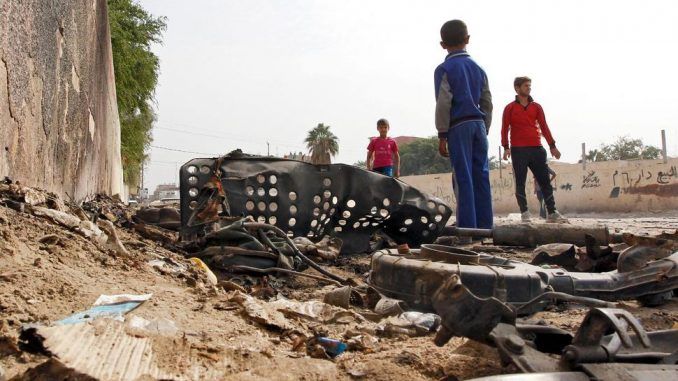
Aid agencies are warning that hundreds of thousands of civilians are trapped in the Iraqi city of Mosul, with U.S.-led forces refusing to create safe escape routes and urging residents instead to “shelter in place”
The risk of a nightmare humanitarian situation increases as the estimated 1 to 1.5 million innocents remain in Iraq’s second-largest city with no way to flee as the military assault on ISIS is about to move into the city. Iraqi forces have for the first time entered the outskirts of Mosul.
Fears for civilians’ lives are growing increasingly urgent. Reports have also emerged that U.S.-led airstrikes killed a family of eight in their home near Mosul on October 22.

BYPASS THE CENSORS
Sign up to get unfiltered news delivered straight to your inbox.
You can unsubscribe any time. By subscribing you agree to our Terms of Use
Common Dreams reports:
“Our main concern now is that operations are getting more and more close to Mosul, so we think it’s now a huge need to ensure the people inside Mosul have a safe way to get out of the city,” Fanny Mraz, the head of mission in Iraq for Handicap International, an organization that helps victims of land mines and other improvised explosive devices, told U.S. News and World Report.
“Without a clear path to allow innocents to flee, Mosul’s estimated 1 million-1.5 million remaining civilians will be stuck as the coalition of Iraqi units begins to root out as many as 5,000 Islamic State group fighters holed up in the encircled city, and as many as 2,000 others in the surrounding area,” U.S. News and World Report writes.
“The United Nations has long estimated that the battle could displace at least 1 million people, worsening the country’s humanitarian crisis, and the agency’s high commissioner for refugees Filippo Grandi said from Baghdad […] that protection of civilians should be ‘the most important element of this operation,'” as Common Dreams reported when the Mosul offensive began last month.
Yet, when approached Monday by U.S. News and World Report about the coalition’s failure to create a so-called humanitarian corridor for civilians, Pentagon spokesman Peter Cook “was less concerned about the likelihood of a mass migration and deferred to Baghdad’s current plan to encourage Mosul civilians to stay in their homes,” the outlet reports. “Iraqi air force planes have dropped leaflets on Mosul in recent weeks saying the safest thing for residents is to shelter in place.”
Fears for civilians’ lives are growing increasingly urgent as new reports emerge that U.S.-led coalition bombs killed a family of eight near the city on October 22.
Relatives, local officials, and Kurdish troops fighting in the area told the Guardian that the bombing was the responsibility of U.S.-led coalition forces.
“Pictures showed villagers uncovering bodies from a pile of rubble that had been a home. The house was hit twice, and some of the rubble and shrapnel was thrown up to 300 meters,” the newspaper reports.”We know the difference between airstrikes, artillery and mortars, we have lived for over two years surrounded by fighting,” Qassim, a relative of the dead, told the Guardian.
The newspaper goes on to report that the U.S. “says it did conduct strikes ‘in the area described in the allegation’ on 22 October. ‘The Coalition takes all allegations of civilian casualties seriously and will further investigate this report to determine the facts.'”
Reports of the United States’ apparent disregard for civilian lives in Mosul follows last week’s revelations from Amnesty International that the U.S. has grossly underestimated the civilian death toll from its campaign against ISIS, particularly when it comes to coalition bombing campaigns in Syria.
The rights group argued that its findings should shed new light on U.S. operations in Mosul: “Failure to see the great harm it causes to civilians throws the Coalition’s Mosul campaign in particular into sharp relief,” Amnesty’s study author Neil Sammonds told Airwars. “If 250 civilians were killed in strikes on the Manbij area, how many times more might be expected to die for Mosul?”


Be the first to comment